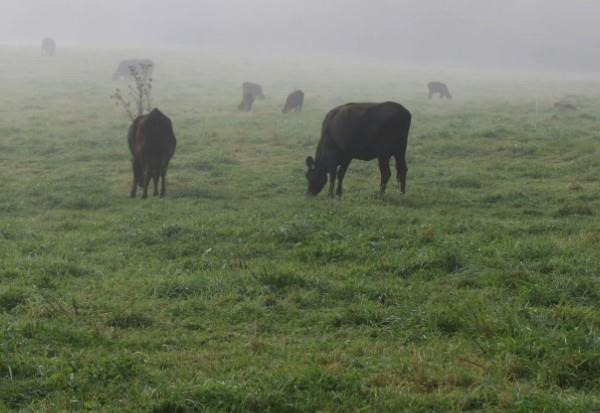By Howard Weiss-Tisman
Wagyu beef is prized for the thin ribbons of buttery fat that run through the steaks, giving it a flavor and texture like no other meat. These cattle originated in Japan, and there aren’t a whole lot of farms in this country that raise 100% pureblood Wagyu cows.
One of those farms is in Windsor County. On a recent misty fall morning, a bucket loader was out front, hooking up a dedicated high speed fiber-optic cable to a barn that’s more than 200 years old. It was a few days before the annual auction at Vermont Wagyu in Springfield, and the farm’s owner Sheila Patinkin was helping the workers figure out how to wire her barn for the big day.
There are less than 5,000 full-blood Wagyu in this country, according to the American Wagyu Association, and a couple hundred are raised right here in Springfield.
“If I watch my genetics, yes, I can provide top genetics in this country to other Wagyu breeders. I can’t say that I produce the best of the best. But I strive to be up there producing some of the best.”
During last year’s auction, Patinkin’s system crashed, and so she called VTel out here to boost her bandwidth for the important sale, which she says makes up about a third of her company’s annual revenue.
“Last year we got a 10-minute interruption, and when you’re broadcasting around the world, you don’t want that to happen in the middle of an auction,” she said.
Cattle ranchers from across the country were expected to tune in, and about 60 animals will be sold during the auction, mostly pregnant females, some of which sell for more than $10,000 apiece. And every single one has the paperwork that shows a direct lineage to one of the first female Wagyu cattle that came to America from Japan in the 1990s.
“If I watch my genetics, yes, I can provide top genetics in this country to other Wagyu breeders,” Patinkin said. “I can’t say that I produce the best of the best. But I strive to be up there producing some of the best.”

Patinkin is 69, and this is her fourth career after raising four kids, working in business and marketing, and almost 20 years as a pediatrician. She had a medical practice in Chicago, and after her husband passed away suddenly, she wanted to move back to Springfield, where she grew up.
More from Vermont Public: A Vermont sheep farmer provides wool fiber for Guggenheim climate crisis performance
She found a farm that had about 150 acres of grassland, and she thought having some cattle would be a good way to manage the land and to maybe make some money raising and selling the animals.
“The initial steps were, let’s deal with the problem of the hayfields," Patinkin said. "And then once we started doing that, I think I became fascinated with the genetics of the Wagyu, with the animals themselves. But I think as we started getting into it, there weren’t too many people doing this, and we became better and better at what we were doing. And there’s a pride in what you do, and realizing that we’re doing a pretty good job of it.
Click here to see more...